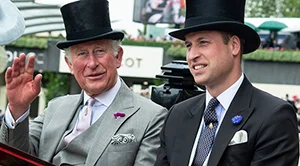 With the year-long celebrations for the Queen’s Platinum Jubilee, the much-discussed topic regarding the British Royal line of succession emerged again, with questions whether Prince Charles or Prince William is more likely to become the next King of England.
With the year-long celebrations for the Queen’s Platinum Jubilee, the much-discussed topic regarding the British Royal line of succession emerged again, with questions whether Prince Charles or Prince William is more likely to become the next King of England.
On February 6th, 2022, Her Majesty The Queen became the first British Monarch who celebrated 70 years of service to the people of the United Kingdon, the Commonwealth and the Realms. The unprecedented anniversary, called a Platinum Jubilee, is being celebrated with various initiatives and events throughout the year. As officially announced by Buckingham Palace, the culmination of the historic milestone for Her Majesty’s reign will take place in a 4-day bank holiday weekend in the UK, from June 2nd to June 5th, with multiple public events and community activities planned.
The annual Queen’s Birthday Parade, commonly known as Trooping the Colour, will be part of the celebrations, with more than 1,400 parading soldiers, 400 musicians, and 200 horses set to take part in the traditional Parade.
The historical landmark in the reign of Her Majesty Queen Elisabeth II, however, once again raised questions whether the line of succession could be broken and Prince William becomes the next King of England.
The British Royal Line of Succession Is Very Strict
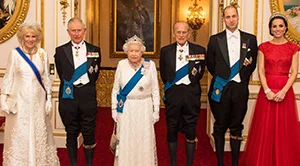 Of course, to be considered in line to the throne, one must be a member of the Royal Family. Other factors including legitimacy, gender and religion are also among the elements that could affect the line of succession.
Of course, to be considered in line to the throne, one must be a member of the Royal Family. Other factors including legitimacy, gender and religion are also among the elements that could affect the line of succession.
The British Royal line of succession dates back to the 17th century. The Bill of Rights (1689) and the Act of Settlement 1701 were restated by the Act of Union 1800, which governed the succession in the UK up until 2013. Before that, only Protestant heirs of Princess Sophia were allowed to succeed the British throne, ruling Catholics, the ones who marry a Catholic, or the ones born out of such a marriage, out of the line. After the latest changes, persons are not disqualified from the line of succession as a result of marrying a Catholic.
Normally, in Britain, the crown was passed from the monarch to their eldest son. If a monarch had an elder daughter but still had a son, they took precedence over any female heirs. However, King George VI had no son, so he was succeeded by his elder daughter, current Queen Elizabeth II.
The aforementioned rules of succession changed in 2013. From then on, the gender of a person born after October 28th, 2011, does not provide that person or their descendants any precedence over the crown. This basically means that, under the new rules, the oldest child inherits the throne no matter their gender.
The current British Royal Line of succession is as follows:
- Prince Charles
- Prince William, Duke of Cambridge
- Prince George of Cambridge
- Princess Charlotte of Cambridge
- Prince Louis of Cambridge
- Prince Harry, Duke of Sussex
- Master Archie Harrison Mountbatten-Windsor
- Miss Lilibet Diana Mountbatten-Windsor
- Prince Andrew, Duke of York
- Princess Beatrice of York
- Miss Sienna Elizabeth Mapelli Mozzi
- Princess Eugenie of York
- Master August Brooksbank
- Prince Edward, Earl of Wessex
- James Mountbatten-Windsor, Viscount Severn
- Lady Louise Mountbatten-Windsor
- Princess Anne, Princess Royal
- Peter Phillips
- Savannah Phillips
- Isla Phillips
- Zara Tindall
- Mia Tindall
- Lena Tindall
- Lucas Tindall
Prince Charles Is Currently Next in Line for the British Throne
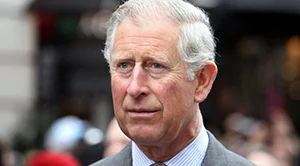 Presently, His Royal Highness Prince Charles is the heir to the British throne as the first-born child of Queen Elizabeth II.
Presently, His Royal Highness Prince Charles is the heir to the British throne as the first-born child of Queen Elizabeth II.
Currently having the Prince of Wales title, he is expected to become king after his mother abdicates, retires, or passes away. When either of these happens, Prince Charles may in his turn choose to abdicate and pass the throne to his eldest son, Prince William, the Duke of Cambridge. Throughout the years, there have been rumours that The Queen may decide to give up the throne voluntarily, leading to Prince Charles’ immediate succession, Buckingham Palace has reported that Her Majesty does not plan to step down for her eldest son. This means that the Prince of Wales will only assume the title after her death.
Although royal biographer Penny Junor has claimed that Prince Charles is “terrified of the prospect” of becoming King, he has been preparing for the top job all his life. As explained by Ms Junor, the Prince of Wales is a very sensitive and emotional man who has been struggling with the death of his father in 2021, so the passing of his beloved mother would be a devastating event for him. However, he has already started planning what the monarchy will look like after his succession to the throne.
Despite he has been preparing for the succession of The Queen all his life, over the years, Prince Charles has suffered criticism due to his failed marriage to late Diana, Princess of Wales and his subsequent marriage to Camila Parker-Bowles, who is now Duchess of Cornwall. However, with a massive portfolio of patronising charitable causes and events, he remains in line to the British throne, in a monarchy that has already started to slim down and is likely to downsize even more with a small number of working royals.
Camila, Dutchess of Cornwall to Become Queen Consort
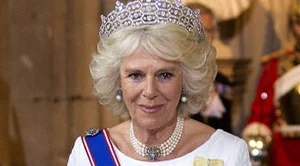 After years of rumours about what title will the Dutchess of Cornwall have after the Prince of Wales takes the throne, it was Queen Elizabeth II who brought clarity to the matter. As part of a message, released at the beginning of February in regard to her Platinum Jubilee, Her Majesty The Queen announced her wish that her daughter-in-law receives the title of Queen Consort when Prince Charles becomes King.
After years of rumours about what title will the Dutchess of Cornwall have after the Prince of Wales takes the throne, it was Queen Elizabeth II who brought clarity to the matter. As part of a message, released at the beginning of February in regard to her Platinum Jubilee, Her Majesty The Queen announced her wish that her daughter-in-law receives the title of Queen Consort when Prince Charles becomes King.
“And when, in the fullness of time, my son Charles becomes King, I know you will give him and his wife Camilla the same support that you have given me; and it is my sincere wish that, when that time comes, Camilla will be known as Queen Consort as she continues her own loyal service”. – HM Queen Elizabeth II
As part of the tradition, the King’s wife receives the title of Queen Consort, which does not have any constitutional authority.
The Queen announces she wants Camilla, the Duchess of Cornwall, to be known as Queen when Prince Charles becomes King https://t.co/gKXla8DPni
— BBC Breaking News (@BBCBreaking) February 5, 2022
However, back in 2005 when Prince Charles married Camilla Parker-Bowles, she became Duchess of Cornwall and Clarence House officials revealed that she will become Princess Consort when her husband becomes King. Reportedly, the move was made out of respect for Prince Charles’ first wife, Diana, who was allowed to keep her Princess of Wales title even after their 1992 divorce to her death in a tragic car accident in August 1997.
At the time she married the Prince of Wales, Camilla was not styled as Princess of Wales, out of respect for Diana. On the other hand, the Royal Family was unwilling to draw much attention to the marriage between Prince Charles and his new wife, who was blamed by the British public for his divorce to Diana and became even more unpopular after the Princess’ death.
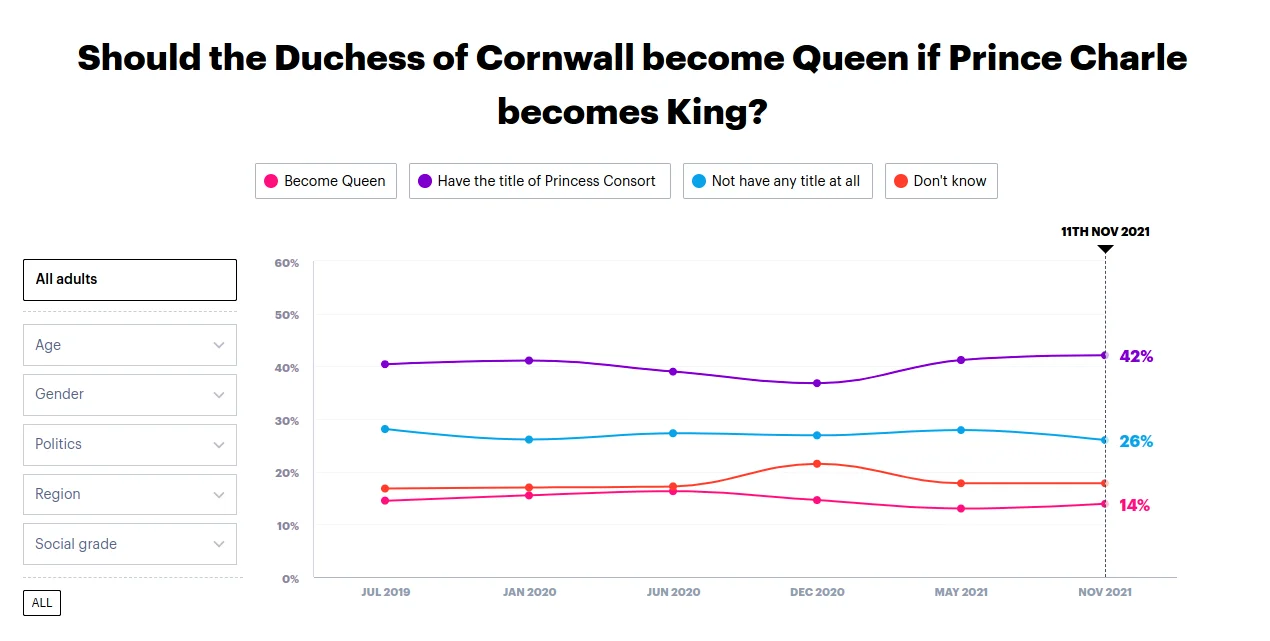
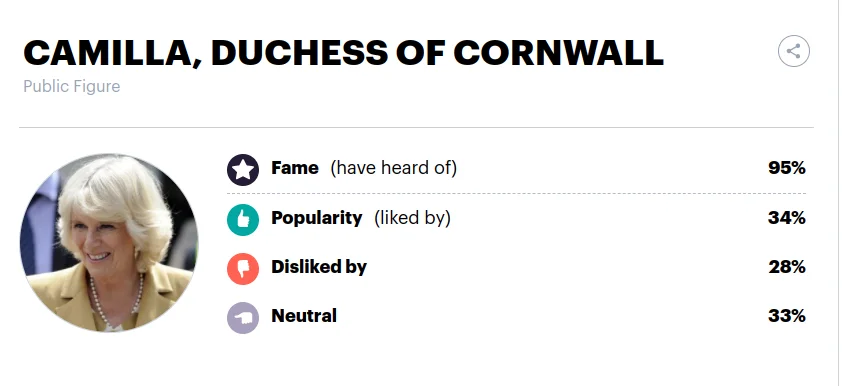
Source: YouGov
Prince Charles Is Not Exactly Brits’ Favourite Member of the British Royal Family Tree
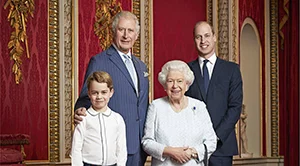 The British Royal family tree is quite extensive, and it is not easy to keep track of the rating of each and every one of its members, but the main players have always been in the spotlight, with every move of theirs being recorded.
The British Royal family tree is quite extensive, and it is not easy to keep track of the rating of each and every one of its members, but the main players have always been in the spotlight, with every move of theirs being recorded.
Throughout the years, there have been multiple studies about the popularity of the members of the Royal Family, and it seems that the current successor of the Queen is not exactly the public’s favourite Royal Family member. Queen Elizabeth II remains the most popular Royalty, with 76% popularity, followed by the Duke and Duchess of Cambridge, who gather 66% and 65% of support, respectively. Prince Charles is 7th, with 45% popularity.
| The Most Popular Royalty (Q4 2021) – YouGov | ||
|---|---|---|
| Fame | Popularity | |
| Queen Elizabeth II | 96% | 76% |
| Prince William, Duke of Cabridge | 97% | 66% |
| Catherine, Dutchess of Cambridge | 93% | 65% |
| Prince Philip, Duke of Edinburgh | 97% | 60% |
| Princess Anne | 94% | 56% |
| Zara Phillips | 88% | 47% |
| Prince Charles | 98% | 45% |
| Sophie, Countess of Wessex | 77% | 42% |
| Prince Harry, Duke of Sussex | 98% | 39% |
| Prince Edward, Earl of Wessex | 87% | 34% |
| Camilla, Duchess of Cornwall | 95% | 34% |
| Princess Eugenie of York | 87% | 30% |
| Princess Beatrice of York | 89% | 29% |
| Meghan, Dutchess of Sussex | 96% | 26% |
| Prince Andrew, Duke of York | 92% | 12% |
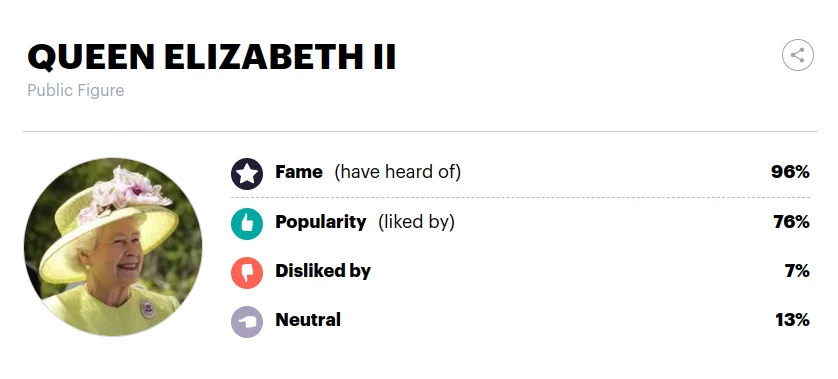
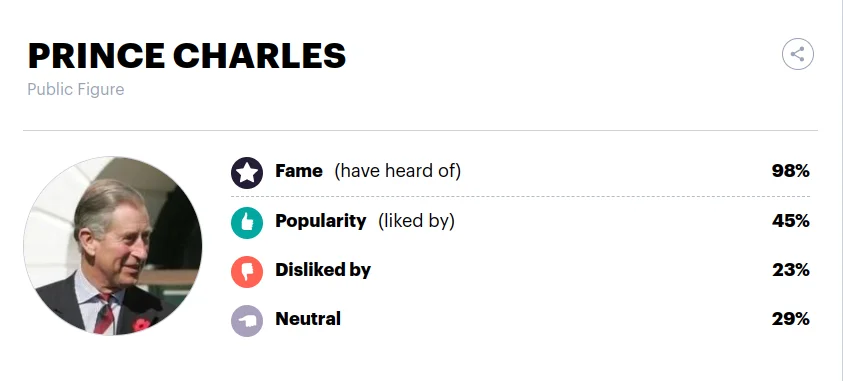
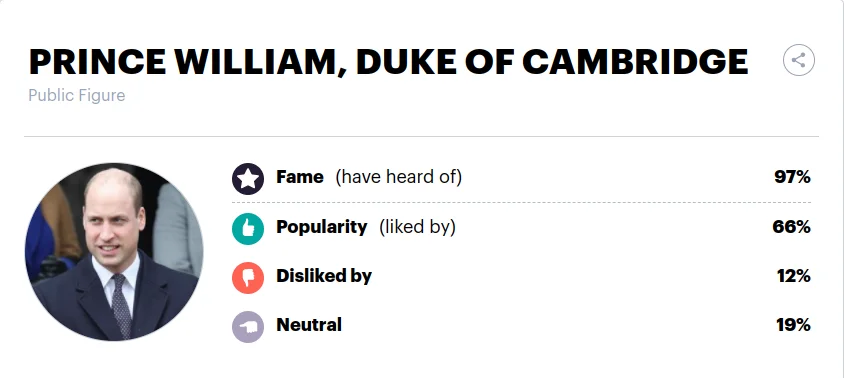
Source: YouGov
Some Experts Say Prince William Could Be the Next King of England But That Is Unlikely to Happen
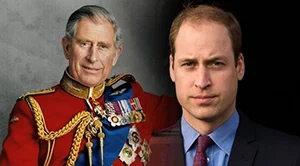 As mentioned above, it would be natural for the Prince of Wales to be willing to become King and perform the Royal duties he has been preparing for all his life.
As mentioned above, it would be natural for the Prince of Wales to be willing to become King and perform the Royal duties he has been preparing for all his life.
However, some people say that it would be equally natural if, after being King for a few years and becoming an elderly monarch, he chose to start a procedure of passing the throne to his eldest son, Prince William. Others say that despite currently being the first in line to the British throne, he could make a decision to pass the crown directly to Prince William.
However, experts from the Constitution Unit of University College London have noted that if Prince Charles makes a decision to pass the crown directly to his some, such an act would require the Parliament to get involved. The experts have explained that under common law, Prince Charles is set to become King automatically the moment Her Majesty The Queen passes away, abdicates or retires.
While his father is alive, Price William would be able to become King only if Prince Charles announces his abdication. This, however, would require a special piece of legislation, as it happened in 1936 with the Declaration of Abdication Act. Currently, it is the Parliament that regulates the British Royal line of succession, so it is the only body that could change the line. The monarch of the day is unable to alter the line of succession.
Just the future King casually walking in the street 😌#PrinceWilliam pic.twitter.com/ypRQamB2wP
— The BRF (@BRFguards) February 16, 2022
It is no secret that Prince Charles is not exactly the most popular member of the British Royal Family. For years, there have been rumours that Queen Elizabeth II herself has been willing to disregard the line of succession and make Prince William the next King of England, instead of Prince Charles. While Brits would probably not mind seeing such a change, this is highly unlikely to happen. As mentioned above, no current monarch is given the power to bring any changes in the line of succession and it would be against the law to do so.
But even if the matter of the involvement of the Parliament did not exist, Prince Charles is currently the most qualified member of the British Royal Family to become King. As the next in line for the throne, he was only 4 years old when the training for his future responsibilities started, so he has been preparing for the moment when he will have the crown literally all his life. Not even his marriage to Camila Parker-Bowles, now the Duchess of Cornwall, could undermine his succession, although that was the second marriage he stepped in, following his scandalous divorce to Princess Diana.
Last but not least, the firstborn son of Prince Charles – Prince William – has never actually shared any aspirations to take the throne early so, for the time being, it seems highly unlikely of he has any claims to the throne before his father. For the time being, the Duke of Cambridge is known to be focused on his family and his job as a working royal.
- Author


